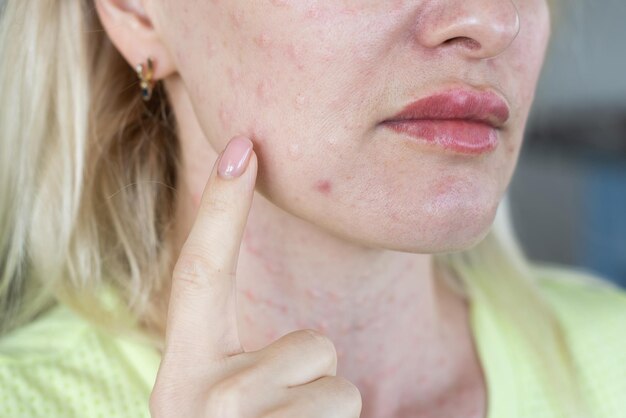Rediscovering Clear Skin: A Comprehensive Guide to Fading Acne Scars
Few things can be as frustrating as dealing with acne scars, the unwelcome reminders of breakouts long gone. The quest for clear, smooth skin often feels never-ending, but fading those scars is possible with the right approach. Whether your scars are new or have been a lingering concern, there's good news: innovations in skincare and treatments can make a significant difference. This guide dives into everything you need to know about fading acne scars, offering you a path to renewed confidence and a healthier complexion.
Understanding Acne Scars and Their Affects
Before delving into treatments, it's crucial to understand what acne scars are and how they form. Acne scars occur when the skin sustains damage during the healing process of acne blemishes. Depending on the level of inflammation and tissue damage, different types of scars can form, such as:
- Atrophic Scars: These include boxcar, ice pick, and rolling scars, which appear as depressions in the skin.
- Hypertrophic Scars: Raised scars that remain confined to the area of the original injury.
- Keloid Scars: Similar to hypertrophic, but extend beyond the original wound area.
Knowing your scar type is important for selecting the most effective treatment methods.
Daily Skincare Routine: Your First Line of Defense
Establishing a consistent skincare routine is crucial in the journey to fade acne scars. Here's a suggested daily regimen:
Gentle Cleansing
Use a mild cleanser to wash your face twice daily. Harsh cleansers can strip your skin of essential oils, prompting irritation and further damage. A gentle formula will clean your pores without causing additional harm.
Exfoliation
Exfoliating is key to removing dead skin cells and promoting the regeneration of new ones. Opt for chemical exfoliants like alpha hydroxy acids (AHAs) or beta hydroxy acids (BHAs) instead of physical scrubs which might irritate the skin.
Moisturizing
Never skip on a good moisturizer that matches your skin type—whether it's oily, dry, or combination. Hydrated skin heals better and more quickly, reducing the appearance of scars over time.
Sun Protection
Exposure to the sun can worsen scarring and darken hyperpigmented areas. Always apply a broad-spectrum sunscreen with SPF 30 or higher every morning to safeguard your skin.
Targeted Treatments: Home Options
For more targeted treatment of acne scars, various home remedies can be integrated into your skincare routine. While evidence varies in effectiveness, many people find success with these options:
Topical Retinoids
Retinoids are derivatives of vitamin A that can accelerate cell turnover, improve skin texture, and reduce scar visibility. Used consistently, they can effectively smooth out atrophic scars.
Vitamin C Serums
Known for its brightening properties, vitamin C helps lighten dark spots and enhance the skin's overall radiance. Regular application can aid in diminishing hyperpigmentation associated with acne scars.
Natural Remedies
- Aloe Vera: Renowned for its healing properties, applying aloe vera gel can soothe inflammation and aid in the regeneration of skin tissue.
- Honey: Its natural antiseptic properties make raw honey ideal for reducing redness and speeding up healing.
- Rosehip Oil: Rich in fatty acids and vitamin A, rosehip oil may improve skin texture and tone.
In-Office Treatments: Professional Assistance
Sometimes, more stubborn scars may necessitate professional intervention. Consult with a dermatologist or skin specialist to explore these professional solutions:
Chemical Peels
Chemical peels involve applying a chemical solution to exfoliate and peel off damaged upper layers of skin, revealing fresher, smoother complexion beneath.
Microneedling
Through the use of fine needles, microneedling creates controlled micro-injuries on the skin surface that boost collagen production and promote healing, effective on both depressed and raised scars.
Laser Therapy
Different laser treatments offer varied benefits, from reducing redness to improving textural irregularities. Laser therapy targets specific scar tissues and promotes skin rejuvenation.
Dermal Fillers
Effective for indented acne scars, dermal fillers can smooth out and elevate depressed scar areas, providing an even skin surface.
Surgery
In cases of severe scarring, minor surgical options like punch excision or subcision may be recommended to physically remove scar tissue or disconnect deep scar fibers.
Diet and Lifestyle: Complementary Practices
Never underestimate the power of a balanced diet and healthy lifestyle in supporting skin health. Incorporate these habits for optimal skin recovery:
Balanced Nutrition
Consume plenty of fruits, vegetables, lean proteins, and whole grains to supply your skin with vital nutrients, vitamins, and antioxidants necessary for repair and regeneration.
Hydration
Adequate water intake ensures skin remains plump and hydrated, facilitating healing and scar fading.
Sleep & Stress Management
Sufficient sleep and stress reduction practices (like yoga or meditation) encourage hormonal balance, further promoting healthier skin.
Navigating Expectations: Patience and Consistency
Fading acne scars is not an overnight process; it requires time and persistence. Responding to treatments and seeing results will vary from person to person. Whether implementing homecare solutions or undergoing professional treatments, continued commitment to a regimen and smart lifestyle choices are crucial for visible improvements.
Final Insight
Combatting acne scars is a multifaceted approach—combining self-care, treatments, and a positive outlook. With patience and the right strategy, clearer skin is truly attainable, empowering you on the journey to embracing a more confident self.
Quick Summary of Tips and Next Steps:
- 🌿 Daily Routine: Stick to a gentle and consistent skincare routine including cleansing, moisturizing, and sunscreen.
- 🌼 Home Remedies: Try topical retinoids or natural oils for lightening scars.
- 💆♂️ Professional Help: Consult a dermatologist for chemical peels or laser treatments if necessary.
- 🍎 Diet & Lifestyle: Emphasize balanced nutrition and regular hydration.
- 🕰️ Patience: Be patient with your skin's healing process; results take time.
By incorporating these steps into your life, you're not just fading scars but nurturing your skin towards a healthier, radiant future.

